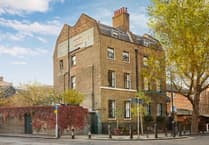Nestled in the rolling Herefordshire hills is Ross-on-Wye, a picturesque market town reminiscent of charm, eccentric independent retailers, and a sense of community. It's the kind of town where people still pop into the high street butchers to have a natter when buying a Sunday lunch, and shop staff address loyal customers by christening name. But while Ross survives on small-town charm, business as a whole is dominated by firms of a much more diverse character; those that make up the FTSE 100 Index.
If we glance at Ross-on-Wye and the FTSE 100, they could hardly look more different. The FTSE 100 is dominated by international giants who trade in unthinkably large size, billions of turnovers, and tens of thousands of overseas personnel. Ross-on-Wye companies, by contrast, focus on personal service, local knowledge, and community interaction. So how do the two business worlds contrast, and what can we learn from both?
What's the FTSE 100, then?
Alright, first of all, to answer the question "what does FTSE stand for" and a quick primer on the FTSE 100: Officially the Financial Times Stock Exchange 100 Index, but more popularly known as the "Footsie", is an index of the largest 100 companies traded on the London Stock Exchange in terms of market capitalization. These are the big guns; the Shells, Unilevers, AstraZenecas, and HSBCs, behind which markets and economies around the globe move. If you’ve ever bought petrol, used a bank, or shopped at a supermarket, you’ve probably interacted with a company that sits comfortably in the FTSE 100.
It is a measure of the UK economy. If the FTSE 100 is climbing, the investors and analysts see it as an indication that the economy's prospects are rosy. If it is falling, the belts are tightened. These companies are so vast and their impact so wide-reaching that they are never out of the limelight, with the share prices yo-yoing on from politics to world disasters. But while these corporate leviathans grab the headlines, the UK's economic heartbeat is elsewhere: In its high streets and local business hubs like Ross-on-Wye.
Ross-on-Wye: A different business environment
Ross-on-Wye doesn’t have billion-pound conglomerates, but what it does have is a thriving community of small to medium-sized businesses that keep the local economy ticking. Take a stroll down the high street, and you’ll find everything from family-run cafés to specialist pet groomers, independent furniture shops, and boutique gift stores. Each of these businesses contributes to the town’s character and charm in a way that no FTSE 100 company ever could.
Let's take a look at some of the businesses that contribute to making Ross-on-Wye what it is:
- Top Cutz Ross Ltd: A popular local hairdresser offering personal grooming services.
- Ross on Wye Flooring: Specialists in high-quality home and business flooring.
- Gorgeous Grooming: A pet shop selling professional grooming and pet accessories.
- New Golden Horse: Chinese takeaway that has been treating locals to traditional dishes.
- Vintage Virtu: A hidden gem providing collectibles and vintage items.
- Winter Wonderland Christmas Shop: A Christmas shop providing Christmas cheer throughout the year.
- Cafe Zam Zam: Savouring delicious tandoori and Balti cuisine.
These businesses, and thousands more just like them, are the backbone of Ross-on-Wye's economy. Unlike the FTSE 100 companies' reliance on international supply chains and complex financial products, these businesses thrive on local patronage, word-of-mouth recommendation, and innovation.
Small vs. large: How do they compare?
The difference between FTSE 100 businesses and Ross-on-Wye's businesses is striking.
FTSE 100 firms deal in numerous countries with enormous customer bases and extensive supply chains. Ross-on-Wye firms deal with neighbourhood customers, though, with personal service and neighbourhood loyalty in mind.
The decisions are quick in a small firm, normally by the owner personally. For a multinational, they pass through levels of management and shareholders, and therefore the decision-making process is much slower.
Small businesses are more flexible than their big counterparts. During difficult times, a Ross-on-Wye coffee house can change its menu or opening times overnight, but a FTSE 100 company has to wade through layers of red tape before anything can be changed.
Going shopping at a local small business frequently includes a personal touch; either a barista who remembers your order or a store clerk who provides honest opinions. Large businesses, however efficient, can't match this type of intimacy.
The interplay between local and global business
Despite appearing light-years away, there's actually a great deal of interaction between independent businesses in Ross-on-Wye and the FTSE 100 big-hitters. For example, most small firms are dependent on goods from FTSE-listed companies; be it a coffee shop selling beverages by Diageo (Guinness brewers) or a hairdresser selling hair products made by Unilever. Likewise, economic downturns for the FTSE 100, such as inflation or shifts in consumer spending, inevitably filter down to independents.
Maybe the biggest threat to small businesses, though, is competition from big companies. Most of the FTSE 100 firms have gone online, and this only makes it more difficult for local stores. Supermarkets, for example, are able to set prices beyond the reach of independent food stores. Small businesses in Ross-on-Wye, though, are managing fine, typically by being about quality, uniqueness, and customer service, or by entering the digital sphere with an online presence.
Why small businesses count
Though the FTSE 100 might try to monopolize the headlines, it is locations like Ross-on-Wye that will have you realize why small business matters. When you support a small business, more of it stays within the local economy, where it will cover employment and local projects. Small businesses also provide the high street with character, blocking out the corporate blandness that makes every town seem like any other.
As the world becomes increasingly dominated by giant corporations, towns like Ross-on-Wye demonstrate that independent companies still have space to thrive. From a family-run coffee shop to a second-hand store or a boutique flooring company, these companies provide a uniqueness and personality, unique from the FTSE 100 companies.




